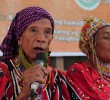The rally, according to Olalia was �just a May 1 celebration, because May 1 is a revolutionary day being celebrated by progressives all over the world.� From that day on in 1945 and many more Labor Day celebrations after that, Olalia would help and lead in organizing more militant organizations. The last and at present the biggest militant labor center that he helped form was Kilusang Mayo Uno (May 1st Movement).
Formed in 1980 by a broad alliance of militant and nationalist unions, federations and alliances that grew strong even as it protested against Martial Law, Olalia and the rest of KMU�s leaders were hounded and jailed by Marcos� troops. For Olalia, it would be his second (and final) arrest and imprisonment under Martial Law. He was first arrested and imprisoned in October 1972; 10 years later, after seeing to the massive expansion and outbursts of progressive activities of the workers� movement, which culminated in the founding of the KMU in May 1980, Olalia was again arrested and jailed in 1982. He was put in solitary confinement. Forced to sleep on cold cement floor for two weeks, Olalia, 79, then already regarded as the �Grand Old Man of Philippine Labor,� fell ill and later died, a �house-arrest� prisoner.
Lasting contributions
Before the heavy-handed government crackdown against militant labor in the 1950s, Olalia served as treasurer of CLO (Congress of Labor Organizations). But after disagreements with other CLO leaders over how militant they ought to be, he led the establishment of Katipunan ng mga Kaisahang Manggagawa (KKM) in 1949, bringing with him and other leaders most of their affiliate unions from big government and private corporations. The KKM spearheaded the 1951 demonstrations against a proposed bill in Congress outlawing strikes in government corporations. The said bill was not enacted into law.
With KKM Olalia again tried to unite labor by forming the Council of Trade Unions in the Philippines, but his efforts failed. However, Marcos in the 1970s would bring back the idea of this united labor by forming the Trade Union Congress of the Philippines (TUCP), for the opposite reasons held by Olalia. The latter worked to unite labor according to its historical revolutionary traditions, Marcos according to the yellow or collaborationist mode of unionism prescribed by the U.S. colonial government since the 1920s, when it became apparent to the U.S. colonial government that they cannot just outlaw militant unionism.
KKM led several demonstrations asking the government to enact laws for the protection and amelioration of the laboring people. As a result of Olalia�s seemingly fearless defense of the workers, he was overwhelmingly elected as Chairman for Labor in the First National Labor-Management Conference held in July 1951 at the Rizal Memorial Coliseum. In his position, Olalia was instrumental in the adoption of various resolutions which the Philippine Congress enacted into laws. For instance, the Magna Carta of Labor, Women & Child Labor Law, Minimum Wage Law, creation of an Agrarian Court and other laws beneficial to labor.
But despite (or because of) his popularity and valuable service to workers, Olalia was arrested by the police for alleged subversive activities later in 1951. Released from jail in 1956, he proceeded immediately to organizing workers, thus courageously flouting the terror of the crackdown on militant unionism.
Before the 1950s ended, Olalia had helped established, at first in 1954, the Confederation of Labor of the Philippines, and in 1957 (after coming into conflict with some CLP leaders concerning honest and genuine trade unionism), the National Federation of Labor Unions (NAFLU).










